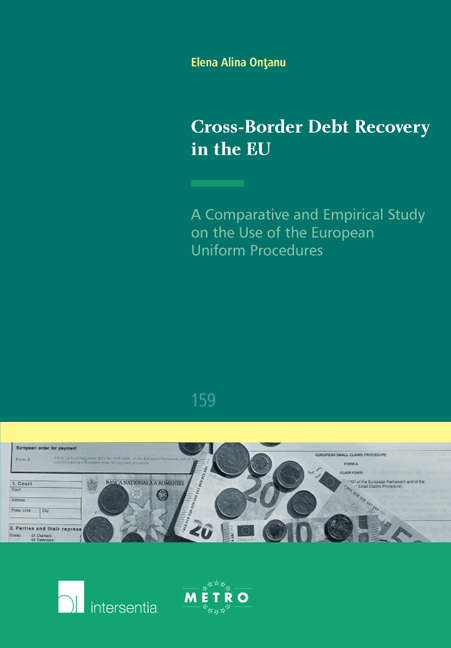 Cross-Border Debt Recovery in the EU
Cross-Border Debt Recovery in the EU Published online by Cambridge University Press: 11 October 2018
Introduction
The Romanian legal system is a civil law system, relying generally on codified law. The precedent is not considered a source of law, but the decisions of the Constitutional Court and of the High Court for Cassation and Justice (Înalta Curte de Casaţie şi Justiţie) have significant authority, and are followed by the other Romanian courts.
Court proceedings in Romania are carried out in accordance with the provisions of the Code of Civil Procedure, the special laws regarding organisation of the judiciary and the applicable court fees. A new Code of Civil Procedure (Noul Cod de procedură civilă – NCPC) was adopted on 15 July 2010, and the law for its entry into force amended part of the NCPC text in 2012. The present code is the materialisation of a need to establish a legislative framework that complies with the requirements of a modern justice system. The text seeks to simplify and accelerate the judicial proceedings (including the execution phase), to secure the predictability of judicial proceedings, and to facilitate direct application of the EU procedural instruments. To draft the new Code of Civil Procedure, the commission in charge took into consideration different European and international sources of procedural law. Since its coming into force on 15 February 2013, the NCPC has been amended several times, the last being in March 2017. A significant number of amendments concern the execution phase, the competence of bailiffs in the execution process, and their access to information. This continuous process of amendments shows that Romanian civil procedure is still developing and adjusting to the needs of modern judicial practice, seeking solutions aimed at securing optimal access to justice for the parties, and facilitating the activities of courts and practitioners.
This chapter considers the procedural choices available to creditors to recover debts before Romanian courts. Along with the ordinary national procedure, the Romanian NCPC offers two special alternative proceedings to which the EOP and the ESCP are added in cross-border litigation. Section 6.2 presents an overview of the national ordinary procedure and its characteristics, followed by a functional analysis of the national special procedures in Section 6.3. The characteristics of these national tailored solutions are also considered in comparison to the EOP and the ESCP.
To save this book to your Kindle, first ensure [email protected] is added to your Approved Personal Document E-mail List under your Personal Document Settings on the Manage Your Content and Devices page of your Amazon account. Then enter the ‘name’ part of your Kindle email address below. Find out more about saving to your Kindle.
Note you can select to save to either the @free.kindle.com or @kindle.com variations. ‘@free.kindle.com’ emails are free but can only be saved to your device when it is connected to wi-fi. ‘@kindle.com’ emails can be delivered even when you are not connected to wi-fi, but note that service fees apply.
Find out more about the Kindle Personal Document Service.
To save content items to your account, please confirm that you agree to abide by our usage policies. If this is the first time you use this feature, you will be asked to authorise Cambridge Core to connect with your account. Find out more about saving content to Dropbox.
To save content items to your account, please confirm that you agree to abide by our usage policies. If this is the first time you use this feature, you will be asked to authorise Cambridge Core to connect with your account. Find out more about saving content to Google Drive.